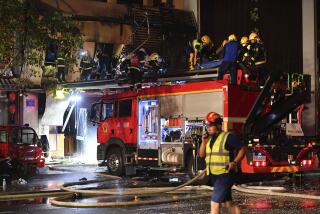Explosion in restive China region kills 7
- Share via
Reporting from Beijing — A man drove an electric tricycle packed with explosives into a crowd in the western Chinese province of Xinjiang on Thursday. The blast, in a region that saw massive ethnic riots last summer, killed seven people and injured 14.
Xinjiang government spokeswoman Hou Hanmin said a man was apprehended at the site of the explosion, which occurred outside the city of Aksu in the west-central part of the province, near China’s border with Kyrgyzstan.
The suspect and victims were all Uighur, a Turkic-speaking minority native to the region. The local government declared martial law and deployed large numbers of police officers, according to reports.
“It was an intentional act because the suspect was carrying explosive devices,” Hou said Thursday at a news conference in Urumqi, the regional capital. He said the case was being treated as a criminal investigation but it was too early to say whether it was an act of terrorism.
The bombing came 13 months after the country’s worst ethnic violence in decades, when protests in Urumqi turned bloody and left about 200 people dead and thousands injured. Officials called the bombing an unfortunate but insignificant incident and said the situation in Xinjiang in general was stable.
“Xinjiang’s development will not be affected by a small group of bad people,” Hou said. “The overall situation in Xinjiang is good.”
Some observers, however, said the attack was an ominous sign of a renewed campaign of violence by separatists.
Xinjiang is a remote but resource-rich province of China much closer to Central Asia than to Beijing. The Muslim Uighurs resent the tight grip the Chinese government began imposing on them in the 1990s after the region had enjoyed decades of autonomy.
As a result of government efforts to bring the country under more centralized rule and develop its western regions, Han Chinese, members of the ethnic group that makes up more than 90% of China’s population, have migrated to the region en masse.
Beijing has tried to appeal to the Uighurs, who have voiced frustration over the influx of Han Chinese, loss of jobs and what they say is the repression of their religion and culture. The Chinese government has launched large-scale campaigns in education and economic development.
Uighur rights activists say that what Chinese authorities have done is carry out “systemic oppression” of the Uighurs.
“After the Urumqi riots, there were still signs of resentment,” said Rohan Gunaratna, a Singapore-based expert on terrorism and the author of “Inside Al Qaeda: Global Network of Terror.”
On July 5, the anniversary of last summer’s riots, the World Uyghur Congress posted a statement saying, “The human rights violations that the Chinese authorities have perpetrated against the Uighurs in the aftermath of the July 2009 incidents have included but have not been limited to: mass and arbitrary detentions and enforced disappearances of Uighurs … arbitrary sentencing of Uighurs to death … and arbitrary executions.”
According to Chinese state media, 25 people have been sentenced to death because of their involvement in the riots.
Violence in the region in recent years has included two attacks during the 2008 Beijing Olympics that killed 27 people. In June, authorities arrested 10 alleged terrorist operatives said to be planning attacks in three cities in the province, including Aksu and Kashgar.
Beijing often blames such violence on separatists acting to bring independence to Xinjiang under the banner of the East Turkestan Islamic Movement.
The government and experts claim the group has a couple of hundred members who work out of the tribal regions of Pakistan and have operatives throughout Xinjiang. Some say the group has support from Al Qaeda.
Thursday’s attack is the first major disturbance since the riots of last summer. The July anniversary passed peacefully.
Speaking Thursday at a news conference before the attack was reported, Xinjiang Gov. Nur Bekri said the government would be battling separatist forces in Xinjiang for a long time.
“I believe we face a long and fierce and very complicated struggle,” he said. “Separatism in Xinjiang has a very long history. It was there in the past, it is still here now, and it will continue in the future.”
Kuo is with The Times’ Beijing Bureau. Tommy Yang of the bureau contributed to this report.
More to Read
Sign up for Essential California
The most important California stories and recommendations in your inbox every morning.
You may occasionally receive promotional content from the Los Angeles Times.










